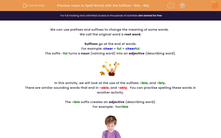We can use prefixes and suffixes to change the meaning of some words.
We call the original word a root word.
Suffixes go at the end of words.
For example: cheer + ful = cheerful
The suffix -ful turns a noun (naming word) into an adjective (describing word).

In this activity, we will look at the use of the suffixes -ible, and -ibly.
There are similar sounding words that end in -able, and -ably. You can practise spelling these words in another activity.
The -ible suffix creates an adjective (describing word).
For example: horrible

The suffix -ibly creates an adverb (word describing a verb or adjective)
For example: terribly
But how do we know when to use -ible and -ibly rather than -able and -ably?
The -ible ending is usually used if a complete root word cannot be heard before it.
For example: possible
However, there are some exceptions to this, and -ible is occasionally used when you can hear a whole word in front of the ending. Unfortunately, there is not a rule for these words - we just have to learn them!
For example: sensible (we can hear the word sense before the suffix).
Here are some examples of words that use these suffixes that we will practise in this activity.
possible
horribly
terrible
visible
incredibly
sensibly
You can listen to them here:
You can break the words up into the root and suffix to help you to spell them
poss ible
horr ibly
terr ible
vis ible
incred ibly
sens ibly
Use Look, Say, Cover, Write, Check to practise spellings a few times before we begin the activities.









